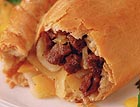Cornish pasty controversy
An age-old row has been fuelled after a Devon food producer won a national award for their Cornish pasty last week.


It is known as the Cornish Pasty, but the counties of Devon and Cornwall have often engaged in a war of words over its’ rightful name, its ingredients, and indeed where it was first made. Fuel was added to this smouldering furnace last week, as ‘Chunk of Devon’ emerged the victors at the inaugural British Pie Awards.
Further controversy has emerged in the wake of the big win, as it has since been revealed that the Devon firm were only allowed to enter the contest as a result of an administrative error. Outraged Cornwall producers are now threatening to boycott the awards in future, having lost out in the ‘blind taste test.’ But Chunk of Devon managing director, Simon Bryon-Edmond, 47, defended their title and criticized their counterparts for ‘resting on their laurels’.
‘We use the best ingredients, sourced from Devon, it is all local and all free range and there are no additives whatsoever - and we use butter rather than margarine. We like everything to be as natural as possible. It is very important that meat is free-range.’ When asked the secret to his success Mr. Bryon-Edmond coyly replied that 'the recipe is no great secret, it’s the best ingredients and the herbs and spices we use.’
The chairman of the British Pie Awards Matthew O'Callaghan admitted that the organisers had made a mistake and apologised to Cornish pie makers.‘There was supposed to be a disclaimer on the application form which stated that all entrants to the Cornish Pasty competition must come from Cornwall.
'It wasn't done and I have to admit that it was an administrative error. The judges held a blind taste competition and felt the Devon pasty tasted the best…Personally I was gutted for the Cornish - it was not a pleasant moment when we realised someone from Devon had won.’
'I knew what it would mean to the Cornwall pie makers and I can only apologise. I understand that all of the old arguments will be brought up again.'
Mr. O'Callaghan is the chairman of the Melton Mowbray Pork Pie association, and as such is fighting his own battle on similar grounds - he is part of the legal bid to keep the name exclusive to Melton Mowbray. 'I believe Cornish pasties should only come from Cornwall and next year we will make that stipulation as part of the awards.’
Exquisite houses, the beauty of Nature, and how to get the most from your life, straight to your inbox.
The Cornish Pasty Association (CPA) was set up in 2002 protect the quality and the reputation of the Cornish pasty. They commented that the judges' decision highlighted the need for the pasty to be awarded Protected Geographic Indication (PGI).
The Department for Environment, Food and Rural Affairs (Defra) approved the CPA's application at the end of last year and it is now being considered by the EU. PGI status is awarded to foods that are unique to a particular geographic area.
CPA chair Philip Ugalde remarked that the attainment of the PGI status would ‘once and for all, sort out the problem…A lot of people can make good pasties and we're not trying to stop that, but don't call them Cornish pasties - call them Devon pasties or something else.’
Debate over the origins of the pasty has long raged between the two counties. Historian Todd Gray discovered a shopping list in 2006, which was written in Devon in 1510, referring to ingredients for ‘pasties’. On the other hand, Les Merton, author of the Official Encyclopedia of the Cornish Pasty, argues that cave drawings show that pasties – wrapped in leaves rather than pastry – were eaten in Cornwall as early as 8,000BC.
Do you know who made the first Cornish pasties? Do you have information that might help to unravel the mystery? Should the Cornish pasty come from Cornwall exclusively…or have the Cornish just got their apron strings in a mess? Have Devon got a valid point to make, or should they stick to clotted cream?
If you have an opinion then do let us know in the comment box below, or email clonews@ipcmedia.com
Country Life is unlike any other magazine: the only glossy weekly on the newsstand and the only magazine that has been guest-edited by His Majesty The King not once, but twice. It is a celebration of modern rural life and all its diverse joys and pleasures — that was first published in Queen Victoria's Diamond Jubilee year. Our eclectic mixture of witty and informative content — from the most up-to-date property news and commentary and a coveted glimpse inside some of the UK's best houses and gardens, to gardening, the arts and interior design, written by experts in their field — still cannot be found in print or online, anywhere else.
